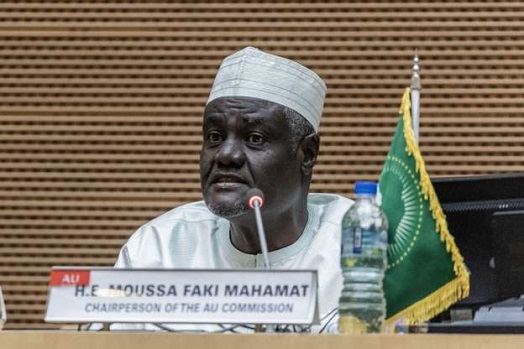The African Union insisted on Sunday it had "zero tolerance" for undemocratic changes of power and vowed to push through a continent-wide free trade deal as it wrapped up a two-day summit.
Leaders of the 55-nation bloc met in the Ethiopian capital Addis Ababa to discuss a slew of challenges facing the continent, including coups, conflict and climate change.
On the final day of the summit on Sunday, the AU said it was maintaining its suspension of four countries -- Burkina Faso, Guinea, Mali and Sudan -- which have been ruled by military leaders following coups.
READ ALSO: 'Coups are not solutions to Africa's problems' - Akufo-Addo
"The assembly reaffirmed zero tolerance against unconstitutional change (of government)," said its Commissioner for Political Affairs, Peace and Security, Bankole Adeoye.
"The Commission is ready to support these member states to return to constitutional order, the idea is that democracy must take root and must be promoted and protected," he told a news conference.
"It is necessary to re-emphasise that the AU remains intolerant to any undemocratic means to political power."
At the end of the summit, the bloc's new chairman, Comoros President Azali Assoumani, said the leaders had agreed to accelerate the implementation of a faltering trade deal launched in 2020.
The African Continental Free Trade Agreement (AfCFTA) is billed as the biggest in the world in terms of population, gathering 54 out of 55 countries on a continent with 1.4 billion people, with Eritrea the only holdout.
"I shall leave no stone unturned to ensure that this becomes a reality," Assoumani said.
African nations currently trade only about 15 percent of their goods and services with each other. The AfCFTA aims to boost that by 60 percent by 2034 by eliminating almost all tariffs.
But implementation has fallen well short of that goal, running into hurdles including disagreements over tariff reductions and border closures caused by the Covid-19 pandemic.
AU Commission chief Moussa Faki Mahamat said the deal was "strategic" for the continent but warned that the infrastructure to allow for its success was still lacking, highlighting that 600 million Africans did not have access to electricity.
On Saturday, UN chief Antonio Guterres said that among its many challenges, Africa was facing a "dysfunctional and unfair global financial system" that denied many countries the debt relief and concessional financing they need and charged them "extortionate" interest rates.
Sanctions under the spotlight
On the sidelines of the AU meeting, the regional Economic Community of West African States (ECOWAS) bloc also said it had maintained sanctions on the three Sahel countries.
"The Authority of Heads of State and Governments decided to maintain the existing sanctions on all three countries," the bloc said in a statement signed on Saturday but shared on Sunday.
ECOWAS has also decided to impose travel bans on government officials and senior leaders in those countries, it added.
Fearing contagion in a region notorious for military takeovers, ECOWAS imposed tough trade and economic sanctions against Mali, but lesser punishments against Guinea and Burkina Faso.
All three countries are under pressure by ECOWAS to return swiftly to civilian rule by 2024 for Mali and Burkina and a year later for Guinea.
Juntas seized power in Mali and Burkina Faso amid anger at the military over the toll from a jihadist insurgency that has claimed thousands of lives and forced millions from their homes.
The coup in Guinea had different causes, being rooted in public anger against then president Alpha Conde over a lurch towards authoritarianism.
Sudan has been gripped by deepening political and economic turmoil since the coup led by army chief Abdel Fattah al-Burhan in 2021 that derailed a short-lived transition to civilian rule following the ouster of Omar al-Bashir in 2019.
"Sanctions imposed on member states following unconstitutional changes of government... do not seem to produce the expected results," he said.
"It seems necessary to reconsider the system of resistance to the unconstitutional changes in order to make it more effective."
AFP





